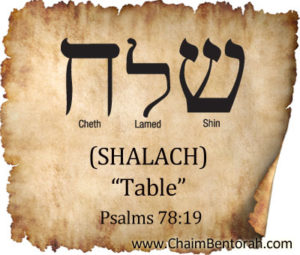HEBREW WORD STUDY – TABLE – SHALACH – שׁלח
Psalms 78:19: “Yea, they spoke against God; they said, Can God furnish a table in the wilderness?”
 “Wold you bothe eate your cake and have your cake?” Thomas Duke of Norfolk to Thomas Cromwell
“Wold you bothe eate your cake and have your cake?” Thomas Duke of Norfolk to Thomas Cromwell
I find it a little disturbing that every modern English translation will render the word shalachan as a table. Shalachan comes from the root word shalach. As a verb shalach means to send someone away, to lay a hand on a person. In other words to forcibly remove a person. Its very origins lie in the idea of separation. It is also a word that is sometimes used for a divorce where a woman is forced to leave against her own desires. As a noun, it has been used to represent a spear which follows the idea of sending away as you would throw a spear. In rare cases, it is used for a table. We automatically assume that a table represents a place to eat.
Tables for eating are really a Greek and Roman invention. Although wealthy Egyptians used pedestals for eating, the general rule was that people ate on the ground. What came to the mind of the Hebrew when they heard table was the table in the tabernacle where they placed the shewbread to show this separation from the cursed earth.
In ancient times a table was used when chieftains would negotiate peace treaties. Here they would actually serve a drink or even a meal as a sign of good faith, in other words, they would not use the opportunity to poison each other. The table became a symbol of a desire to settle a dispute. Even today we talk about moving to the negotiating table. Thus the origin of the word shalak for table comes from the idea of separating one from each other’s differences.
Translations associate the table with food because the context clearly speaks of the Hebrews complaining about manna and desiring some variety. Yet why use the word shalach which remotely suggest food and not the word ‘okel which speaks clearly of a variety of food?
We read that they “spoke against God. “ The word spoke is dabar which are words from one’s heart. There is a beth found as a prefix before the word Elohim – God. The Beth often denotes the preposition in or on. On occasion, it can read as against. Yet can read this as they spoke in authority in God. They were not foolish enough to speak against God. They spoke in God suggesting they were speaking God’s will. Many times we do the same, we invoke God’s will as our will. Who can argue against God’s will?
The next words: “Can God furnish” uses the word la’arok which is rendered as furnished. The word la’arok is in an infinitive construct state which would express a purpose or result. This comes from the root word ‘arak which means to set in order or arrange. So what we have is: “Is God not able to arrange a table?” They were suggesting that they would negotiate with God and work out a settlement.
I believe the writer, under the inspiration of God, used the word shalach (table) rather than ‘okel (food) to show a much deeper problem than wanting just a variety of food. The writer was showing that by wanting to negotiate with God they were showing that redemption was not enough, the presence of God was not enough, they wanted more, and they wanted their own fleshly desires satisfied as well. The idea can best be expressed in a letter from Thomas the Duke of Normandy to Thomas Cromwell on March 14, 1538: “You can’t eat your cake and have it too.” This has become an English idiom which means that once you have eaten your cake you don’t have it anymore. Yet, the presence of God you can always have.
In other words, they were saying was that God was big enough to give them a smorgasbord and they could still have His presence. “Yippee, ain’t God wonderful, oh how He knows how to give good gifts to His children, He is rich, He owns the cattle on a thousand hills, money, money…” Israel was only fooling themselves, as we often do. In our hearts, all we want is a sugar daddy, not a father. We want a genie in the lamp and not a husband or a bride.







Recent Comments